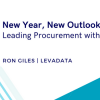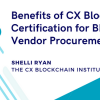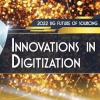With the increased ability to automate, procurement can move away from transactional tasks and focus on strategic initiatives.
Today, about 80% of large organizations are using artificial intelligence in their core business – compared to about 10% just five years ago. Companies that focus on AI are harnessing opportunities from vast data availability, machine learning and complementary technologies such as cloud, Internet of Things (IoT) and 3-D printing. And they are doing so with a focus on short-term benefits as well as long-term growth. According to Harvard Business Review, if you miss out, the opportunity cost could be as much as 41% of revenue by 2023.
Artificial intelligence represents an excellent opportunity for procurement. Advanced analytics and automation create better and faster insights, increasing the value procurement can generate for the business. According to SAP’s CPO Survey 2018, 83% of respondents believe that digital transformation is impactful, but currently only 5% have automated processes in place. With the increased ability to automate, procurement can move away from transactional tasks and focus on strategic initiatives. However, analytics and data quality remain some of the largest roadblocks to achieving functional efficiency. Talent management and lack of talent strategy are also blockers for future success.
The Changing Landscape
To generate business value, the need for procurement to embrace technology tools has never been more critical - technology has always been a key driver in enabling improved efficiency and effectiveness. According to The Hackett Group’s research, procurement is now at an inflection point and procurement organizations should turn to digital transformation to ensure they can continue reducing costs and delivering value. The research also found that digital transformation can enable typical procurement organizations to reduce process costs by 30%.
A recent Forrester report estimated the eProcurement market to be growing at 11% per year. Process efficiency is an incentive, but equally as important is the ability to aggregate procurement data such as vendor details, contracts and purchase orders, which has led to the application of AI to mine large volumes of procurement data and generate actionable insights.
Turning Data Into Actionable Insights
Some of the key elements of the future procurement function include automating processes by embracing the wave of digital transformation. You should aim to increase data quality and collaborate with finance, as well as investing in robotic process automation (RPA) and AI. For a successful procurement transition, organizations need to focus on the development of necessary tools, ensure adoption by creating high-quality user experience, and incorporate both new and existing technologies.
While the volume of data is important, the reality is that quality of the data matters most. Businesses now enjoy greater access to data about their suppliers and customers, but turning the data into actionable insights and providing prescriptive guidance to buyers can be challenging. Analytics, insights and master data quality are the most significant inhibitors for the procurement function efficiency.
One of the critical challenges for the procurement function is to access unstructured data in the form of spreadsheets, digital documents and email inboxes. Turning these into a digital format allows for data to be analyzed and has the potential to reveal remarkable insights. This leads to innovation as digitalization of data means that information can be processed intelligently and accurately.
AI technology, combined with human knowledge, is the mandatory combination of an effective classification and segmentation process. It ensures businesses can quickly collate, visualize and action insights from existing data sources. Connecting people and information guided by intelligent procurement systems can fundamentally change how companies buy and sell and can open up broad visibility into the interconnected operations of buyers and suppliers.







